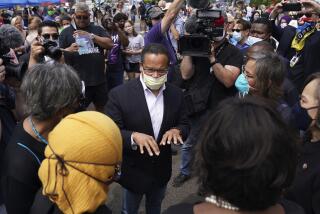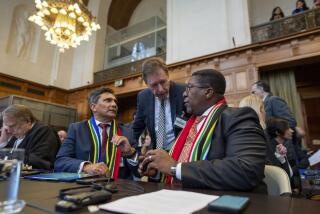U.N. Panel Asks Deadline on Apartheid : Firms Would Withdraw If System Persists
- Share via
UNITED NATIONS — A panel on multinational corporations recommended Friday that the Security Council order the withdrawal of foreign businesses from South Africa unless apartheid is substantially ended by Jan. 1, 1987.
Malcolm Fraser, former prime minister of Australia and head of an 11-member “panel of eminent persons” that conducted hearings on the subject Sept. 16-20, said foreign corporations should “put up or shut up” if they sincerely profess opposition to the South African political system.
As of now, the group said, international corporations remaining in South Africa should stop the sales of computers, motor vehicles, aircraft or other “dual purpose” equipment to the military, police or other security forces. Other recommendations called for desegregation of races on the job, equal pay and benefits and allowing black workers to have their families live near the job.
Conflict With Law
The last recommendation admittedly would bring foreign firms into conflict with South African law, Fraser said. But he said that all corporations contacted by the panel had expressed opposition to the South African racial laws, which deny black voting rights and restrict where blacks may travel and live. If international businesses hesitate to meet the standards set by the panel, Fraser said, they “ought to get out.”
The chairman conceded that no corporate executive had appeared at the hearings last month, despite invitations extended to 1,000 international firms. But he said the panel received written responses from the “vast majority” of 50 large companies to whom he had addressed subsequent messages. The responses indicated support for the statements made by South African industrial associations, which had endorsed full civil rights for blacks.
News Organizations
Attached to the panel report was a list of U.S. and other transnational corporations “with interests in South Africa.” The U.S. list included such news organizations as the Los Angeles Times, the New York Times, the Christian Science Monitor, Associated Press and United Press International, as well as the three U.S. television networks and National Public Radio Corp. News agencies of other nations were not listed, however.
Asked why the U.S. news organizations were cited--in the case of the Los Angeles Times, there is only a rented office for its correspondent--a panel aide said the staff was unable to verify the extent of investment and activity of each business.
“Nobody is trying to say that news gathering agencies shouldn’t be in South Africa,” Fraser said.
More to Read
Sign up for Essential California
The most important California stories and recommendations in your inbox every morning.
You may occasionally receive promotional content from the Los Angeles Times.













